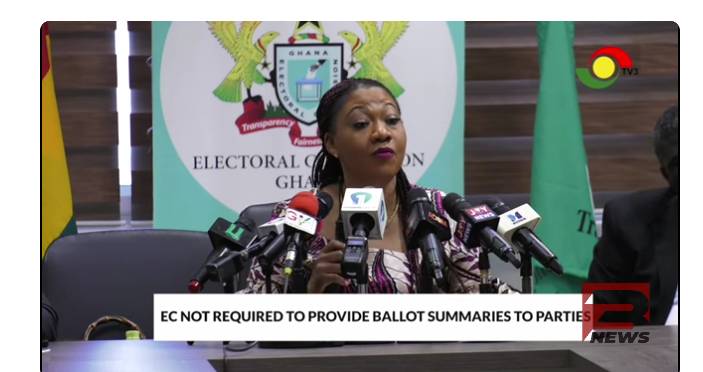Electoral Commission Not Required to Provide Ballot Summaries to Parties – Jean Mensa
In a recent statement, Jean Mensa, the Chairperson of the Electoral Commission (EC) of Ghana, clarified that the Commission is not legally obligated to provide ballot summaries to political parties during the election process. This announcement has sparked discussions among political parties and election observers, as many had previously expected the Commission to share detailed election summaries as part of a transparency effort.
During an address covered by 3NewsGH, Jean Mensa emphasized that the current electoral laws and regulations governing the EC do not mandate the Commission to provide such summaries. “There is no legal provision that compels the Electoral Commission to furnish political parties with ballot summaries,†she stated. According to her, the Commission is committed to conducting free, fair, and transparent elections, but the provision of ballot summaries is not explicitly required under Ghana's election code.
Mensa went on to explain that the EC’s responsibility is to ensure that all ballots are accurately counted, verified, and securely transmitted to the national collation center, where results are finalized. “Our focus is to maintain the integrity of the electoral process,†she remarked, adding that ensuring accuracy in vote counting is the Commission's primary goal. In her view, the release of ballot summaries to individual parties could lead to unnecessary speculation and disputes, especially when there are minor discrepancies in local polling data.
This stance, however, has received mixed reactions from political parties, with some calling for a change in policy. Representatives from major opposition parties argue that ballot summaries would enhance accountability and trust in the electoral process, especially as the 2024 elections approach. They believe that access to these summaries would allow them to cross-check results independently, reducing concerns about possible tampering or errors.
Political analysts have noted that, while the EC is technically correct in its interpretation of the law, the decision could affect public perception. Dr. Kojo Appiah, a political science lecturer, explained that providing ballot summaries could foster transparency and prevent misunderstandings. “In a highly charged electoral environment, any step towards greater transparency can build trust in the system,†he said.
Despite the criticisms, the EC maintains that its current measures are sufficient to guarantee transparency. According to Mensa, the Commission’s deployment of biometric verification, electronic transmission systems, and independent observers at each polling station already constitute a robust approach to ensure the credibility of results. She highlighted that representatives from each party are permitted to witness vote counting and collation at every stage, which she believes should address their concerns about transparency.
As the 2024 elections draw near, the debate around electoral transparency is expected to intensify. While the EC’s current policies align with Ghana’s electoral laws, political parties and civil society groups may continue to press for further reforms to address their concerns. For now, Jean Mensa and the EC remain firm in their stance, reinforcing their commitment to a fair and credible election process, even if ballot summaries remain off the table.
The Electoral Commission has reiterated that it will continue to prioritize accuracy and integrity in vote counting while resisting pressures to adopt additional measures that are not legally required. In her concluding remarks, Mensa assured Ghanaians that the Commission’s top priority is safeguarding the nation’s democratic process.




No comments yet
Be the first to share your thoughts!